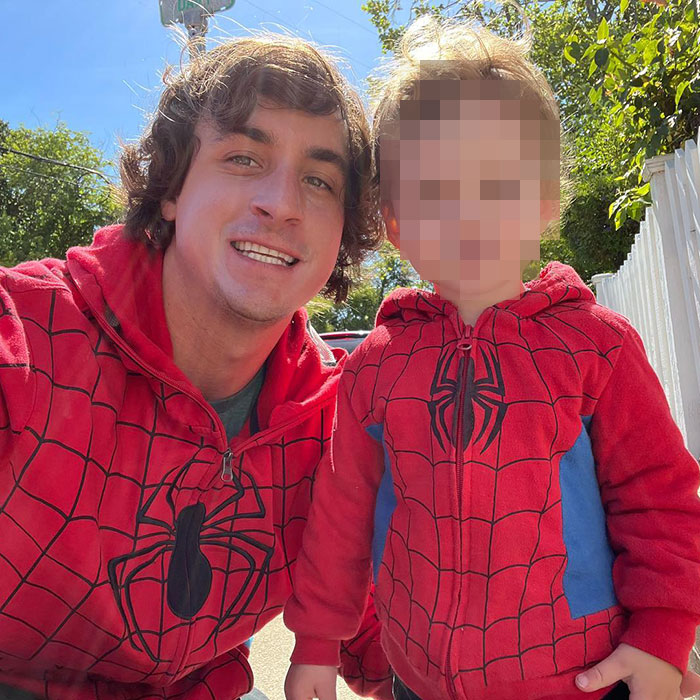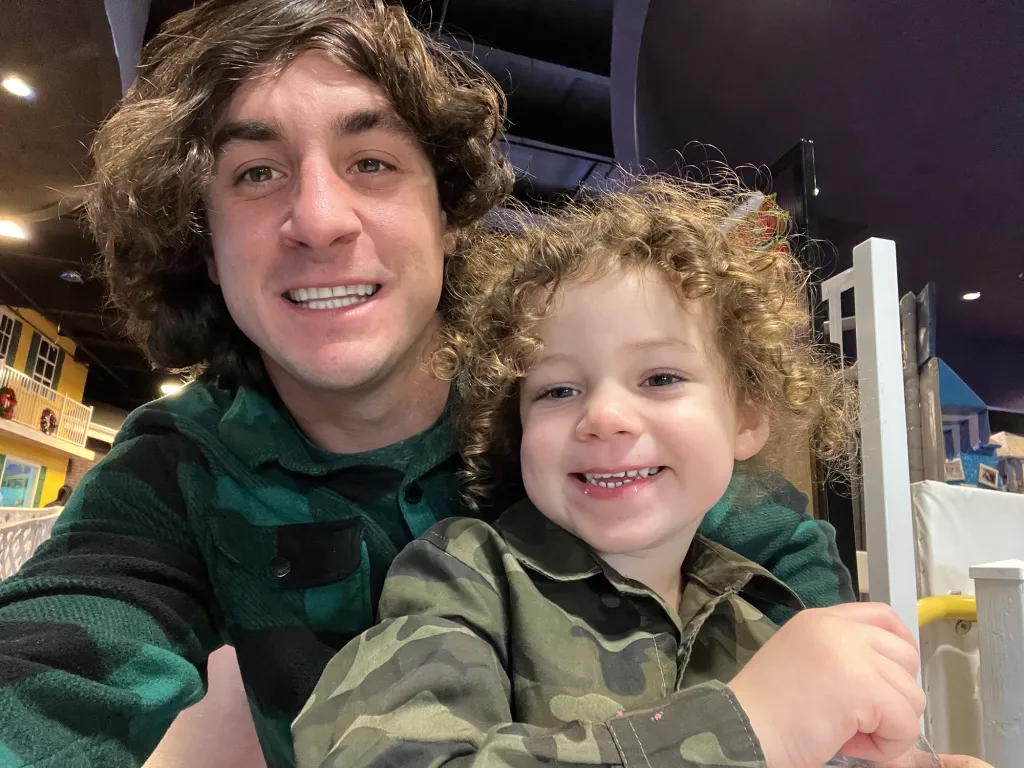In a landmark legal battle that has captured public attention, California father Harrison Tinsley has won full custody of his four-year-old son, Sawyer. This victory comes after a prolonged and emotionally charged dispute with the boy’s mother, who identifies as a lesbian and non-binary. Tinsley claimed that the mother attempted to raise Sawyer as non-binary, despite the child’s expressed desire to identify as a boy.

The custody battle is not just about parental rights—it also raises broader questions about the influence of parental ideologies on young children, the complexities of custody disputes, and the critical role of child protection services in ensuring the welfare of minors. Let’s explore this case, examining the legal twists, emotional turns, and societal implications it carries.
The Beginnings of the Battle: A Father’s Fight for His Son
Harrison Tinsley’s legal journey to secure custody of Sawyer began with joy and hope but quickly turned into a challenging ordeal. In 2019, Tinsley was overjoyed when his former girlfriend announced her pregnancy. However, the relationship ended shortly after, leading to a separation that left Tinsley with limited access to his son.
Early Struggles and Limited Access
From the onset, Tinsley faced obstacles in building a relationship with Sawyer. The boy’s mother restricted Tinsley’s access, which only added to the father’s frustration. Tinsley’s first meeting with Sawyer didn’t occur until the child was 15 months old, marking the beginning of a difficult journey filled with legal battles and emotional hurdles.
Despite these early struggles, Tinsley remained determined to be a part of Sawyer’s life. His commitment set the stage for what would become a high-stakes custody battle centered not only on parental rights but also on questions of gender identity and child welfare.
Allegations of Imposed Gender Ideology: A Father’s Concerns
At the heart of Tinsley’s custody case were his concerns about the way Sawyer’s mother was influencing the boy’s gender identity. According to Tinsley, the mother attempted to raise Sawyer as non-binary, referring to him with they/them pronouns, dressing him in girls’ clothing, and encouraging behaviors that aligned with a gender identity different from his biological sex.
The Specific Allegations
Tinsley alleged that Sawyer’s mother would dress the boy in girls’ diapers, dresses, and makeup. He even claimed that she refused to let Sawyer go on rides at Disneyland unless he wore princess shoes. For Tinsley, these actions represented a form of coercion that disregarded Sawyer’s wishes to be identified as a boy.
Tinsley’s argument centered on the idea that children should be free from adult-imposed ideologies, particularly at such a young age. He believed that Sawyer should be allowed to explore his identity naturally, without pressure from either parent.
The Mother’s Perspective
While the identity of Sawyer’s mother has not been publicly disclosed, reports suggest that she maintained a different perspective on gender identity, emphasizing the importance of allowing children to explore their own identities freely. However, Tinsley claimed that her approach went beyond support and became a form of ideological imposition.
The Legal Twist: Felony Child Endangerment and the Turning Point
The custody battle took a dramatic turn when Sawyer’s mother was arrested for felony child endangerment. This incident became a significant factor in the case, prompting Child Protective Services (CPS) to investigate the situation more closely.

Tinsley’s Pursuit of Full Custody
Following the mother’s arrest, Tinsley intensified his efforts to gain full custody of Sawyer. He presented extensive evidence, including police bodycam footage and other documentation, to support his case. Tinsley also alleged defamation and slander by the mother, claiming that she tried to paint him as an unfit parent with extreme political views.
Despite these efforts, the initial court ruling favored the mother. Tinsley’s request for full custody was denied, leaving him frustrated and disheartened. However, he refused to give up, deciding to appeal the decision.
The Role of Child Protective Services (CPS)
CPS played a crucial role in the case, conducting a thorough investigation that ultimately recommended awarding full custody to Tinsley. The CPS investigators, according to Tinsley, put politics aside and focused solely on what was best for Sawyer. This unbiased approach was instrumental in changing the course of the custody battle and ensuring that the child’s welfare was prioritized.
The Victory: A Father’s Joy and Relief
Tinsley’s victory in the custody battle marked a significant moment for him as a parent. With full custody granted, he could finally focus on providing a stable and supportive environment for Sawyer.
The Importance of Letting Kids Be Kids
Now living with his father, Sawyer is thriving. Tinsley describes his son as “the most amazing, greatest blessing” of his life. For Tinsley, the core message is simple: kids should be allowed to be kids. He believes that children’s identities should be shaped by their own experiences and interests, rather than being molded by adult ideologies or societal pressures.
In Tinsley’s words, “Kids don’t care about sex or identity or all of these fake weird concepts. They just care about having fun and spending time with their parents.” His approach emphasizes allowing children to explore their identities in a pressure-free environment, focusing on love, play, and positive experiences.
Broader Implications: Parental Rights, Gender Ideology, and Legal Systems
This case raises significant questions about parental rights, gender ideology, and how legal systems handle sensitive issues related to children’s welfare.
Parental Rights in Custody Disputes
Custody disputes are often complex, involving intense emotions and competing interests. Tinsley’s case serves as a reminder of the importance of safeguarding parental rights while also ensuring that children’s voices are heard. It also highlights the need for clear legal guidelines on matters related to parental influence over a child’s identity, particularly when it involves complex topics like gender.
The Debate Over Gender Ideology
The case has reignited discussions about gender ideology and its influence on young children. Some argue that parents should be allowed to encourage their children to explore diverse gender identities, while others believe that such influence can confuse children and potentially harm their psychological development.
This debate extends beyond individual cases and touches on broader societal questions: To what extent should parents impose their beliefs on their children? How can the legal system balance parental rights with the need to protect children’s autonomy and well-being?

The Role of Child Advocacy and Protection
Amid the legal battles and media attention, one thing remains clear: the need for strong child advocacy and protection. Ensuring the best interests of children must be the top priority in any custody dispute, particularly when issues like gender identity are at play.
The Role of CPS and Legal Professionals
In this case, CPS’s role was crucial in evaluating the situation and making recommendations based on Sawyer’s welfare. Tinsley himself acknowledged that CPS investigators likely held different political views from his own, but he praised them for their professionalism and dedication to the child’s best interests.
This approach sets a positive example for how legal professionals, social workers, and child advocates can work together to prioritize children’s well-being over political or ideological considerations.
The Emotional Toll of Custody Battles
Custody battles can be emotionally exhausting, not only for parents but also for the children caught in the middle. Tinsley’s journey was filled with moments of hope, despair, and resilience. His determination to fight for his son’s rights and well-being underscores the lengths to which parents will go to protect their children.
Impact on Children’s Mental Health
Prolonged custody disputes can have a significant impact on children’s mental health. In Sawyer’s case, the battle over his custody could have created confusion and stress, underscoring the importance of timely resolutions in legal disputes involving minors.
A Message of Hope and Advocacy for Children
Tinsley’s victory is not just a win for him—it’s a testament to the importance of putting children first. His story serves as an example of what can happen when parents remain steadfast in their love for their children, even when faced with overwhelming odds.
The case is also a call for open and respectful dialogue on complex issues like gender identity and parental rights. While opinions may differ, the goal should always be to create a society where children feel safe to explore their identities and where parents feel supported in making decisions that prioritize their children’s best interests.
Conclusion: Children’s Rights Above All Else
Harrison Tinsley’s custody battle is more than a story about parental rights; it’s a lesson in the importance of prioritizing children’s well-being, allowing them to grow freely, and ensuring that legal systems act in their best interest. It’s a reminder that children are individuals with their own identities, and they deserve protection from harm—whether it’s physical, emotional, or psychological.
As society continues to navigate complex discussions about gender, identity, and parenting, this case serves as a call to approach these issues with empathy, respect, and a commitment to protecting the most vulnerable: the children.